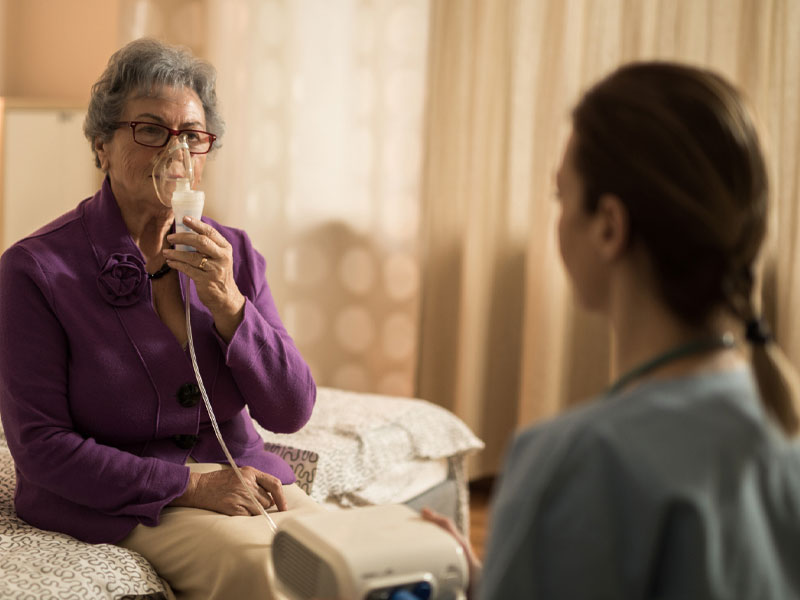
Hospice care provides specialized care and support for individuals with a terminal illness, such as lung disease. It addresses the physical, emotional, and spiritual needs of the patient and their family, and can be provided in the patient’s home or in a hospice facility. Eligibility for hospice care is determined by a medical evaluation and Medicare guidelines. Hospice care provides physical comfort, emotional and spiritual support, and family support to those facing the end of life.



Chronic Obstructive Pulmonary Disease (COPD) is a progressive lung disease that makes it difficult to breathe. It is caused by damage to the lungs, usually from smoking or exposure to harmful chemicals and pollutants. COPD is a leading cause of death worldwide, and it is estimated that there are currently 251 million people living with COPD globally.
Pulmonary diseases refer to a group of conditions that affect the lungs and respiratory system. These include conditions such as asthma, bronchitis, and emphysema. These conditions can cause difficulty breathing and make it harder for the body to get the oxygen it needs.
The Centers for Medicare and Medicaid Services (CMS) have established specific criteria that must be met for a patient to be eligible for hospice care. These criteria include:
Prognosis of Six Months or Less
The patient must have a prognosis of six months or less if the disease runs its normal course. This means that the patient’s doctor must believe that the patient’s condition is terminal and that they will not recover.
Decline in Condition Despite Treatment
The patient must have had a decline in their condition despite treatment. This means that the patient’s condition has worsened over time, and the treatments that have been tried have not been effective in improving the patient’s condition.
Frequent Hospitalizations or Nursing Home Care
The patient must require frequent hospitalizations or nursing home care. This means that the patient’s condition is so severe that they require frequent medical attention, and they cannot be cared for at home.
According to the CMS.gov, for hospice care eligibility, a patient should have a chronic, progressive lung disease and meet any of the following criteria:
It is important to note that these criteria are not set in stone and can be adjusted in certain circumstances. A hospice care provider will work with the patient and their family to determine if the patient is eligible for hospice care and to develop a care plan that meets their individual needs.
One of the main benefits of hospice care for COPD patients is the management of symptoms and pain. Hospice care teams include trained professionals such as nurses, doctors, and social workers who are experienced in managing the symptoms of COPD. They can help the patient manage their shortness of breath, chest pain, and other symptoms that can be uncomfortable and distressing. Hospice care teams can also provide medications to help manage pain and other symptoms.
Hospice care also provides emotional and spiritual support to the patient and their family. Coping with a terminal illness can be difficult and emotional, and hospice care teams can provide counseling and support to help the patient and their family cope with the end of life. They can also provide spiritual support and guidance, if desired, to help the patient find peace and acceptance.
Hospice care teams can also provide assistance with activities of daily living. As COPD progresses, patients may have difficulty performing basic tasks such as bathing, dressing, and eating. Hospice care teams can provide assistance and support to help the patient with these tasks and improve their quality of life.
Lastly, hospice care teams can coordinate care with the patient’s primary care physician and other specialists to ensure that the patient receives the best possible care. Hospice care teams work closely with the patient’s primary care physician to develop a care plan that is tailored to the patient’s individual needs. This continuity of care can ensure that the patient’s needs are met, and they are comfortable during the end of life.
It is important to note that hospice care is most effective when it is started early. By starting hospice care early, patients can benefit from the comfort and support that hospice care provides. Additionally, early referral can help the patient and their family prepare for the end of life and make the most of the time they have together.
If you or a loved one is living with COPD and you are interested in hospice care, there are many resources available to help you learn more about hospice care and find a hospice care provider in your area. Some of these resources include the National Hospice and Palliative Care Organization, the Hospice and Palliative Care Association of the United States, and the National Institute on Aging.

Meet Matthew, a healthcare professional with over 10 of experience in the medical field. With a passion for improving end-of-life care, Matthew brings a wealth of knowledge and expertise to Hospice Report. Matthew has worked in a number of strategic marketing roles at some of the largest healthcare networks globally and brings a unique perspective on the future of patient care.

Copyright 2023 Hospice Report, All Rights Reserved. | Privacy Policy